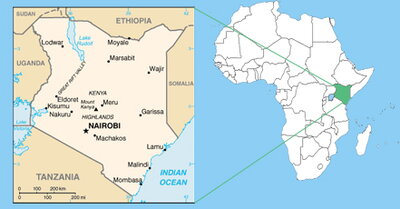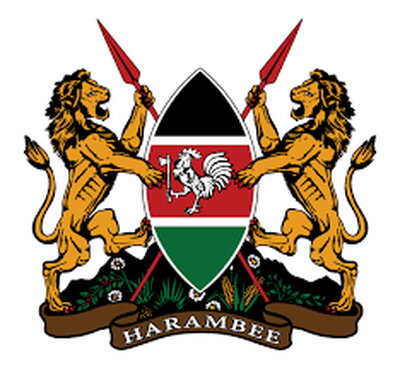

Region: Eastern Africa
Quick Facts:
- Population: 32.8 million
- Capital: Nairobi
- Area: 224,961 sq miles (slightly more than twice the size of Nevada)
- Major Languages: Swahili, English
- Life Expectancy: 48 years (men), 46 years (women)
- Literacy: 85.1%
- Monetary unit: 1 Kenya shilling (KES)= 100 cents
- Exchange Rate: US $1= 68.7 KES (March 17, 2007)
- Income (GDP) per capita: $1165 (constant 2000 international $, WDI 2005)
- Urban population: 21% of total population
- Paved roads: 12% of total road surface
- Electric Power Consumption (per capita): 125 kWH
- Fixed line and mobile phone subscribers: 85 per 1,000 people
- Internet Users: 45 per 1,000 people
- Internet Domain: .ke
- Country Code: +254
- Time Difference: UTC +3 (9 hours ahead of Illinois during Standard Time)
- Climate: Tropical. Hottest month is February (78-84F ), coldest month July (68-74F)
- Type of Government: Republic
- President: Mwai Kibaki, Prime Minister: Raila Odinga
Historical and the Political Background:
The Portuguese colonized Kenya (and much of East Africa) in the 1500s, but were overthrown by Omani Arabs in 1730. Colonization intensified with the establishment of a German protectorate over the Sultan of Zanzibar's coastal possessions in 1885, followed by the arrival of the Imperial British East Africa Company in 1888.
After independence from Britain in 1963, Kenyan politics was dominated by the ruling Kenya African National Union, which was also the only legal political party through much of the 1980s. This period also saw power increasingly concentrated in the office of the president. Violent unrest—and international pressure—led to the restoration of multi-party politics in the early 1990s, but it was to be another decade before opposition candidate Mwai Kibaki ended nearly 40 years of KANU rule with his landslide victory in 2002's general election. While the 2002 elections were considered free and fair, there were reports of widespread improprieties in the December 2007 presidential elections. Early returns and exit polls favored the opposition candidate, Raila Odinga, however the Electoral Commission of Kenya (ECK)certified Kibaki as the winner by a substantial margin. Meanwhile European Union observers and others reported rigging from both political groups. The protests that followed escalated into unprecedented violence and destruction of property, with up to 1000 deaths and 250,000 people displaced as a result.
With the intermediation of the UN, European Union, African Union, United States government and others Kibaki and Odinga signed an agreement on the formation of a coalition government including both a president and a prime minister. Odinga became Kenya's Prime Minister while the President, Kibaki, agreed to appoint cabinet ministers from both his party and Odinga’s. One outcome of this agreement has been the creation of an exceptionally large cabine
Economy:
After independence, Kenya promoted rapid economic growth through public investment, encouragement of smallholder agricultural production, and incentives for private (often foreign) industrial investment. Gross domestic product grew at an annual average of 6.6 percent from 1963 to 1973 and agricultural production grew at an annual rate of almost five percent during the same period. Such rapid growth was spurred by land reform, diffusing new crop strains, and opening new areas to cultivation. Kenya is the largest tea producer in Africa.
In 2006, Kenya and China signed several bilateral agreements allowing China to dominate Kenya’s promising onshore oil exploration. Kenya also secured Chinese grants worth several hundred million shillings in the sectors of economic and technical cooperation, health research and the urban development of Nairobi.
Kenya continues to be the primary communication and financial hub of East Africa. It enjoys the region's best transportation linkages, communications infrastructure, and trained personnel, although it has also been afflicted by corrupt governance in the recent past. A wide range of foreign firms maintain regional branch or representative offices in the city.
Kenya is one of the world’s main tea producers and vies with Sri Lanka for the title of number one tea exporter. Smallholders account for about 60% of production and multinational-owned estates for the other 40%. The sector has benefited from liberalization and the privatization in 2000 of the Kenya Tea Development Authority (KTDA), which markets the smallholder crop. Kenyan horticulture has also grown rapidly since the mid-1980s. It became Europe’s largest flower supplier in the 1990s and holds about 25% of the global market. Coffee was one of the country’s main exports until the mid-1980s. Although Kenyan coffee is renowned for its high quality, and the bulk is exported, most of the coffee is produced by small-scale farmers in cooperative societies. In recent years, however, this sector has decline while production of cut flowers and vegetables have boomed.
Trade Information:
- Exports: $3.614 billion (2006 est.)
- Export Goods: Tea, coffee, horticultural products, petroleum products, cement, pyrethrum, soda ash, sisal, hides and skins, fluorspar
- Main Export Partners (2005): Uganda (15.1%), UK (10.4%), US (9.4%)
- Imports: $6.602 billion (2006 est.)
- Import Goods: Machinery, vehicles, crude petroleum, iron and steel, resins and plastic materials, refined petroleum products, pharmaceuticals, paper and paper products, fertilizers, wheat
- Main Import Partners (2005): UAE (11.4%), US (10.2%), India (8.6%)
Resources for Businesses:
Embassy of Kenya, Washington, D.C.
2249 R. Street, NW
Washinton DC 20008
Telephone: (202) 387-6101
Fax: (202) 462-3829

Ministry of Trade and Industry
Director of External Trade
P.O Box 30430-00100
Telposta Tower
Kenyatta Avenue
Nairobi, Kenya
Tel: (254) 20 315001
Fax: (254) 20 252896
Email: det@tradeandindustry.go.ke
Kenya National Chamber of Commerce
Peter J. Muiruri
Information and PR Officer
Haille Seillaissie Rave
Nairobi
Kenya 0254
Tel: (254) 20 220867
Fax: (254) 20 334293
E-Mail: muiruripita@yahoo.com
Value-chain Based Matching Grant Fund
Deloitte Offices
"Kirungii" Ring Road Westlands
P O Box 40092 - GPO 00100
Nairobi, Kenya
Phone: (254) 20 4441344/05-12
Fax: (254) 20 4448966
Email: valuechain@deloitte.co.ke
Last updated on 04/15/2009